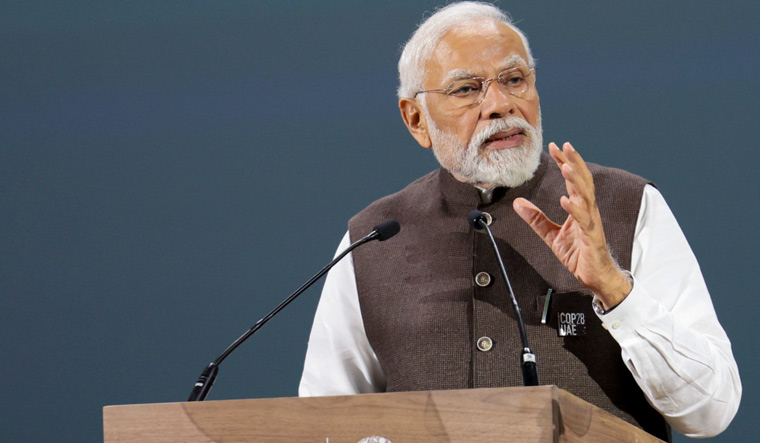As the world gathers for COP28 in Dubai, India has an opportunity to build on the momentum gained during its G20 presidency in September that marked significant milestones to mitigate climate change. Reiterating India's G20 theme – One Earth, One Family, One Future – for a sustainable future, Prime Minister Narendra Modi said during his opening address at the World Climate Action Summit on Friday, “India is on track to achieve its Nationally Determined Contributions (NDCs) and reached its non-fossil fuel targets nine years before the deadline”.
Modi said the country's population is 17 per cent of the global population, but its global carbon emissions is less than 4 per cent. “We have set our targets to bring the emissions down by 45 per cent by 2030 and shall continue to move ahead to achieve net-zero target by 2070." He said a consensus was built on Green Development Pact for a sustainable future during India's G20 presidency and historic milestones like Global Biofuels Alliance, push for Green Hydrogen and tripling renewable energy capacity by 2030 were agreed upon.
Referring to Mission LiFE (Lifestyle for Environment) introduced during COP 26 in Glasgow, the prime minister said as per the study of International Energy Agency, such an approach can reduce carbon emissions by two billion tonne every year.
“Today from this platform I suggest a “pro-planet” and “pro-active” Green Credit Initiative that goes beyond carbon credit and is a people's movement to create carbon sinks,” he said. The introduction of 'Green Credit Program' and the 'Ecomark scheme' by the Ministry of Environment, Forest and Climate Change in October 2023 precedes this announcement. The initiative seeks to encourage environmentally friendly practices rooted in tradition and conservation reflecting the ideas of the 'LiFE' concept. "We do not have much time to correct the mistakes of the last century," Modi said and asked every nation to work sincerely to meet their NDC targets.
“We have to strike a fine balance between adaptation, mitigation, climate finance, Loss and Damage,” he said, while proposing COP33 in 2028 to be held in India. He also called for climate justice and equity, urging substantial financial and technological support from the Global North. Around 200 countries are participating in the 28th Conference of the Parties (COP28) to the United Nations Framework Convention on Climate Change (UNFCC) being held in Dubai under the presidency of United Arab Emirates (UAE) from November 30 to December 12.
COP28 started on an optimistic note on Thursday with 196 parties adopting the decision to operationlise the Loss and Damage Fund, which was agreed upon in the previous COP in Sharm El Sheikh in Egypt. Although the development is being viewed as a win for developing countries, the initial corpus of the fund would be $400 million, much less than the estimated $400 billion every year. The developed countries have already kept the promise of providing $100 billion a year unmet since 2009. In the backdrop of the reluctance of the developed countries to financially handhold the developing world in climate action, the decision to operationalise the Loss and Damage Fund with initial corpus of $400 million is seen as positive but not fulfilling.
Some of the other pivotal issues that COP 29 is expected to deliberate upon are Global Stocktake, a key part of the Paris Agreement, which assesses the collective progress in achieving agreed climate goals and ensuring 1.5 degree Celsius target of the Paris Agreement.
But there are challenges ahead. Fossil fuel text will continue to be contentious, with the US and European Union supporting the phasing out “unabated” fossil fuels.“The podium that was offered to prime minister is testimony to India's changing geopolitical clout but also its long-standing economic partnership with the UAE. On climate issues, the prime minister established all the good work on clean energy which is underway in India. He also reiterated India’s leadership and representation as the voice of the Global South, championing the need for equity in carbon budget,” said Aarti Khosla, director, Climate Trends.
“At these meetings the missing element so far has been how to tackle fossil fuel transition. The PM spoke about the need for that to be orderly, just and equitable. The green credits scheme sounds positive in theory but more is to be seen."
She said India's offer to host the UNFCCC COP33 in five years is a good diplomatic masterstroke given the mood of the climate discussions in Dubai. While India is trying to make all the right noises in promoting sustainable living and eco-friendly practices, pushing for alignment with global sustainability goals and reiterating commitment to environment conservation, the attitude and actions of the developed countries, most notably the US and China, will play a pivotal role in shaping the global climate politics. For now, US President Joe Biden and Chinese President Xi Jinping are likely to skip COP28.
At COP28 India seeks to build on strides made during G20 presidency
Modi proposes to host COP33 in 2028 in India; launches Green Credit Initiative
 By
Mohit Sharma
Updated: December 01, 2023 19:46 IST
By
Mohit Sharma
Updated: December 01, 2023 19:46 IST

Join our WhatsApp Channel to get the latest news, exclusives and videos on WhatsApp
Read more
-

Truce by Easter? Buzz in Ukrainian circles about Donald Trump's '100-day plan'
-

Barcelona superstar Pedri can become 2034 World Cup ambassador if he moves to Saudi: Report
-

New teaser of 'Alien: Earth', from 'Fargo' creator, piques fans' curiosity
-

From more sops to further easing of regulatory hurdles: What startups expect from Union Budget 2025
-

How NVS-02 launch will propel India's spacefaring ambitions?
*Articles appearing as INFOCUS/THE WEEK FOCUS are marketing initiatives
